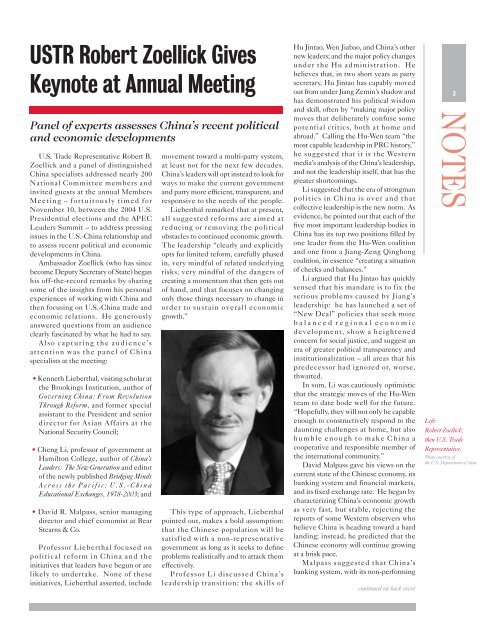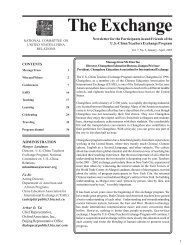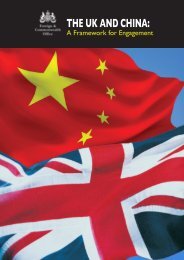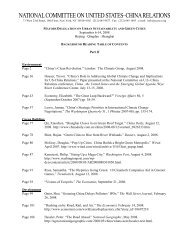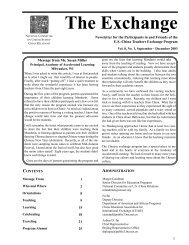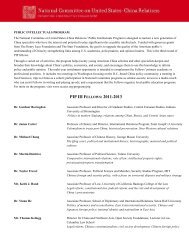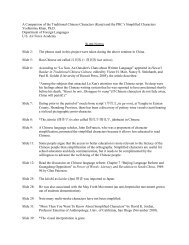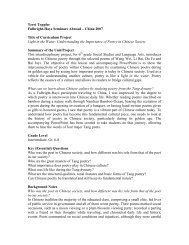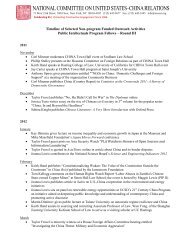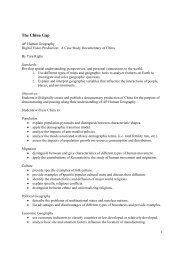New Program - National Committee on United States-China Relations
New Program - National Committee on United States-China Relations
New Program - National Committee on United States-China Relations
You also want an ePaper? Increase the reach of your titles
YUMPU automatically turns print PDFs into web optimized ePapers that Google loves.
USTR Robert Zoellick Gives<br />
Keynote at Annual Meeting<br />
Panel of experts assesses <strong>China</strong>’s recent political<br />
and ec<strong>on</strong>omic developments<br />
U.S. Trade Representative Robert B.<br />
Zoellick and a panel of distinguished<br />
<strong>China</strong> specialists addressed nearly 200<br />
<str<strong>on</strong>g>Nati<strong>on</strong>al</str<strong>on</strong>g> <str<strong>on</strong>g>Committee</str<strong>on</strong>g> members and<br />
invited guests at the annual Members<br />
Meeting – fortuitously timed for<br />
November 10, between the 2004 U.S.<br />
Presidential electi<strong>on</strong>s and the APEC<br />
Leaders Summit – to address pressing<br />
issues in the U.S.-<strong>China</strong> relati<strong>on</strong>ship and<br />
to assess recent political and ec<strong>on</strong>omic<br />
developments in <strong>China</strong>.<br />
Ambassador Zoellick (who has since<br />
become Deputy Secretary of State) began<br />
his off-the-record remarks by sharing<br />
some of the insights from his pers<strong>on</strong>al<br />
experiences of working with <strong>China</strong> and<br />
then focusing <strong>on</strong> U.S.-<strong>China</strong> trade and<br />
ec<strong>on</strong>omic relati<strong>on</strong>s. He generously<br />
answered questi<strong>on</strong>s from an audience<br />
clearly fascinated by what he had to say.<br />
Also capturing the audience’s<br />
attenti<strong>on</strong> was the panel of <strong>China</strong><br />
specialists at the meeting:<br />
• Kenneth Lieberthal, visiting scholar at<br />
the Brookings Instituti<strong>on</strong>, author of<br />
Governing <strong>China</strong>: From Revoluti<strong>on</strong><br />
Through Reform, and former special<br />
assistant to the President and senior<br />
director for Asian Affairs at the<br />
<str<strong>on</strong>g>Nati<strong>on</strong>al</str<strong>on</strong>g> Security Council;<br />
• Cheng Li, professor of government at<br />
Hamilt<strong>on</strong> College, author of <strong>China</strong>’s<br />
Leaders: The <str<strong>on</strong>g>New</str<strong>on</strong>g> Generati<strong>on</strong> and editor<br />
of the newly published Bridging Minds<br />
Across the Pacific: U.S.-<strong>China</strong><br />
Educati<strong>on</strong>al Exchanges, 1978-2003; and<br />
• David R. Malpass, senior managing<br />
director and chief ec<strong>on</strong>omist at Bear<br />
Stearns & Co.<br />
Professor Lieberthal focused <strong>on</strong><br />
political reform in <strong>China</strong> and the<br />
initiatives that leaders have begun or are<br />
likely to undertake. N<strong>on</strong>e of these<br />
initiatives, Lieberthal asserted, include<br />
movement toward a multi-party system,<br />
at least not for the next few decades.<br />
<strong>China</strong>’s leaders will opt instead to look for<br />
ways to make the current government<br />
and party more efficient, transparent, and<br />
resp<strong>on</strong>sive to the needs of the people.<br />
Lieberthal remarked that at present,<br />
all suggested reforms are aimed at<br />
reducing or removing the political<br />
obstacles to c<strong>on</strong>tinued ec<strong>on</strong>omic growth.<br />
The leadership “clearly and explicitly<br />
opts for limited reform, carefully phased<br />
in, very mindful of related underlying<br />
risks, very mindful of the dangers of<br />
creating a momentum that then gets out<br />
of hand, and that focuses <strong>on</strong> changing<br />
<strong>on</strong>ly those things necessary to change in<br />
order to sustain overall ec<strong>on</strong>omic<br />
growth.”<br />
This type of approach, Lieberthal<br />
pointed out, makes a bold assumpti<strong>on</strong>:<br />
that the Chinese populati<strong>on</strong> will be<br />
satisfied with a n<strong>on</strong>-representative<br />
government as l<strong>on</strong>g as it seeks to define<br />
problems realistically and to attack them<br />
effectively.<br />
Professor Li discussed <strong>China</strong>’s<br />
leadership transiti<strong>on</strong>; the skills of<br />
Hu Jintao, Wen Jiabao, and <strong>China</strong>’s other<br />
new leaders; and the major policy changes<br />
under the Hu administrati<strong>on</strong>. He<br />
believes that, in two short years as party<br />
secretary, Hu Jintao has capably moved<br />
out from under Jiang Zemin’s shadow and<br />
has dem<strong>on</strong>strated his political wisdom<br />
and skill, often by “making major policy<br />
moves that deliberately c<strong>on</strong>fuse some<br />
potential critics, both at home and<br />
abroad.” Calling the Hu-Wen team “the<br />
most capable leadership in PRC history,”<br />
he suggested that it is the Western<br />
media’s analysis of the <strong>China</strong>’s leadership,<br />
and not the leadership itself, that has the<br />
greater shortcomings.<br />
Li suggested that the era of str<strong>on</strong>gman<br />
politics in <strong>China</strong> is over and that<br />
collective leadership is the new norm. As<br />
evidence, he pointed out that each of the<br />
five most important leadership bodies in<br />
<strong>China</strong> has its top two positi<strong>on</strong>s filled by<br />
<strong>on</strong>e leader from the Hu-Wen coaliti<strong>on</strong><br />
and <strong>on</strong>e from a Jiang-Zeng Qingh<strong>on</strong>g<br />
coaliti<strong>on</strong>, in essence “creating a situati<strong>on</strong><br />
of checks and balances.”<br />
Li argued that Hu Jintao has quickly<br />
sensed that his mandate is to fix the<br />
serious problems caused by Jiang’s<br />
leadership: he has launched a set of<br />
“<str<strong>on</strong>g>New</str<strong>on</strong>g> Deal” policies that seek more<br />
balanced regi<strong>on</strong>al ec<strong>on</strong>omic<br />
development, show a heightened<br />
c<strong>on</strong>cern for social justice, and suggest an<br />
era of greater political transparency and<br />
instituti<strong>on</strong>alizati<strong>on</strong> – all areas that his<br />
predecessor had ignored or, worse,<br />
thwarted.<br />
In sum, Li was cautiously optimistic<br />
that the strategic moves of the Hu-Wen<br />
team to date bode well for the future.<br />
“Hopefully, they will not <strong>on</strong>ly be capable<br />
enough to c<strong>on</strong>structively resp<strong>on</strong>d to the<br />
daunting challenges at home, but also<br />
humble enough to make <strong>China</strong> a<br />
cooperative and resp<strong>on</strong>sible member of<br />
the internati<strong>on</strong>al community.”<br />
David Malpass gave his views <strong>on</strong> the<br />
current state of the Chinese ec<strong>on</strong>omy, its<br />
banking system and financial markets,<br />
and its fixed exchange rate. He began by<br />
characterizing <strong>China</strong>’s ec<strong>on</strong>omic growth<br />
as very fast, but stable, rejecting the<br />
reports of some Western observers who<br />
believe <strong>China</strong> is heading toward a hard<br />
landing; instead, he predicted that the<br />
Chinese ec<strong>on</strong>omy will c<strong>on</strong>tinue growing<br />
at a brisk pace.<br />
Malpass suggested that <strong>China</strong>’s<br />
banking system, with its n<strong>on</strong>-performing<br />
c<strong>on</strong>tinued <strong>on</strong> back cover<br />
3<br />
NOTES<br />
Left:<br />
Robert Zoellick,<br />
then U.S. Trade<br />
Representative.<br />
Photo courtesy of<br />
the U.S. Department of State


